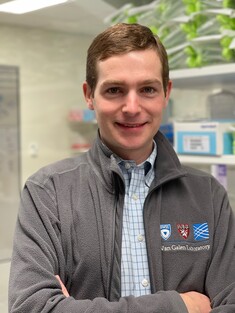Events
May 12, 2022
Seminar (2022-05-12)
School of Biomedical Sciences is pleased to invite you to join the following seminar:
Date: Thursday, 12 May, 2022
Time: 9:00 am – 10:30 am
Via Zoom: https://hku.zoom.us/meeting/register/tJEtcOCvrzwrE9PkDlZrUvr7WPR_HPZO4H7b
Meeting ID: 950 7971 7197
Password: 551774
Speaker: Dr. Peter van Galen, Assistant Professor, Department of Medicine, Harvard Medical School and Associate Molecular Biologist, Hematology Division, Brigham and Women’s Hospital, USA
Title: “Tracing leukemia evolution and immune cell interactions using single-cell multi-omics”
Biography

Dr. Van Galen investigates regulation of normal and malignant hematopoiesis. His graduate work with Dr. John Dick revealed roles for the Unfolded Protein Response and lineage priming in maintaining human hematopoietic stem cell homeostasis (Cell Stem Cell, Nature, 2014). During his postdoc with Dr. Bradley Bernstein, he studied transcriptional heterogeneity in acute myeloid leukemia, combining single-cell RNA-sequencing and genotyping to reveal disrupted regulatory networks and processes that drive malignant progression (Cell, 2019). He started his independent laboratory in 2019 at Brigham and Women's Hospital, Harvard Medical School and the Broad Institute. Building on prior work, his research program develops and applies single-cell sequencing technologies to enable lineage tracing in clonal hematopoiesis (Nat Biotechnol, 2022) and study interactions between immune cells in leukemia (Front Immunol, 2022). The ultimate goal is to leverage newly gained knowledge to improve people’s health.
Abstract
Cellular heterogeneity is essential for tissue homeostasis. In the blood, transcriptional/epigenetic states underlie differentiation stages and the age-related acquisition of somatic mutations leads to genetic heterogeneity. To analyze heterogeneous tissues, single-cell genomics has emerged as a powerful tool. The integration of multiple modalities can be especially informative, such as single-cell RNA-seq for gene expression, ATAC-seq for chromatin accessibility, somatic mutations for clonal evolution, and TCR-seq for T cell clonotypes. We apply these technologies to study normal and malignant human hematopoiesis. In acute myeloid leukemia, this enables the characterization of subclone-specific differentiation hierarchies and gene expression. In clonal hematopoiesis, we demonstrate that mitochondrial variants can be used to reconstruct cellular relationships. In a dendritic cell leukemia, we link the expansion of interferon-producing tumor cells to clonal T cell expansions and exhaustion. Overall, these studies demonstrate how single-cell multiomics can improve our understanding of complex human tissues and inform clinically relevant immune cell interactions in leukemia.
ALL ARE WELCOME
Should you have any enquiries, please feel free to contact Miss Angela Wong at 3917 9216.

